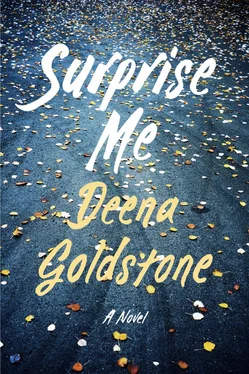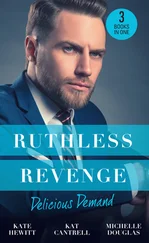“Meaning you don’t agree.”
Isabelle shakes her head. “That ending will work, but…”
“Spit it out, Isabelle.”
“My heart is aching for them to find each other again.”
“That’s the difference between us. I’ve lived thirty years longer and I know that what the heart wants isn’t always possible.”
Isabelle nods and says no more.
—
BEV ARRIVES AT THE CABIN in the late afternoon, after all her baking for the next morning is done. Sometimes she gets there when Daniel is still sleeping, and then the two women have a chance to catch up, sitting on the bench outside the cottage, at the edge of the pond. From there they can see the barn and sometimes Alina if she makes her way outside to the garden.
“Does she ever come to visit Daniel while you’re with him?” Isabelle asks as the two women watch Alina harvest pole beans for dinner, snapping them off the tall vines, which now cover the teepee with a blanket of green.
“No.”
“And she’s never once come in while we’re working.”
“Alina leaves him be. Nothing’s changed since his diagnosis.”
“But now, Bev? How can she do that now?”
“I don’t think she knows how to do anything else. Neither one of them is big on interpersonal skills.”
—
SOMETIMES BEV WILL DRIVE ISABELLE back to town if there’s time, but often, as the days of summer lengthen, Isabelle will choose to walk the two miles. It’s a time to decompress from the intensity of Daniel and their work together and the urgency of the ticking clock.
Lately, as she walks, Alina and her newest rescue dog join her for part of the way. Alina uses the excuse that the puppy, a Lab-spaniel mix named Trixie, needs the exercise. But it is very clear to Isabelle that the daughter wants information about her father, and so she starts off these walking conversations with a progress report.
“He was in a better mood today,” she might say, or “He had more trouble walking later in the day,” or “We’re getting close to a solid draft.”
Alina doesn’t ask questions. She simply listens. She both wants and is afraid to hear how Daniel is doing. At first Isabelle respected the distance Alina keeps, but after several weeks of largely one-sided conversations, she’s had enough.
“Ask me questions,” she demands one day. “There must be so much more you’d like to know.”
Alina shrugs but says nothing, so like Daniel in her gesture that Isabelle almost comments on it.
“You’d be interested in what he’s writing about.” Isabelle knows she’s being provocative, but she can’t help herself. She’s angry at this grown woman who acts like she’s still that five-year-old whom Daniel left. “Would you like to know?”
“Hmmm.”
“The book is about a father who’s tormented by his daughter’s rejection of him.”
“Seriously?”
“Yes.”
“He thinks I’m rejecting him when he’s the one who abandoned us ?”
“Alina, that was decades ago. Don’t you think your reaction today, as a woman well past forty, might be a little more… nuanced ?”
“What does he want from me?”
“Forgiveness.”
“Because he’s dying?”
“Because we all have regrets.”
Alina shakes her head. “That’s not a good reason.”
“Because Daniel is a wiser, better man than the one who left you.”
Alina shakes her head again, not looking at Isabelle as they walk, not buying a word of what Isabelle is selling.
Finally Isabelle says softly, “Because he loves you.”
And Alina looks stricken, as if Isabelle has just given her news that the world is ending. She has no idea what to do with the information.
“Go in to see him,” Isabelle says gently as they walk. “Sit with him. It doesn’t matter what you say or even if you say a word.” There’s no response from Alina, but Isabelle continues on, breaking down the task as if she’s talking to that grieving five-year-old. “Open the door to his cottage, take a kitchen chair, bring it close to his bed. Be with him. That’s all he wants.”
Alina whistles for the dog, snaps the leash on the puppy, shakes her head finally— I can’t, I won’t —and starts back toward her barn.
—
AS ISABELLE HAD HOPED, at first the energy within the book, the enthusiasm she brings to the collaboration, carries Daniel along and he feels better. And she is cheered and hopeful that they will be able to finish, and even he is optimistic. But as the weeks accrue, it becomes clear that Daniel is failing. Breathing has become more of a labored activity. The pain medication he was given no longer works. He needs help walking from the couch to the kitchen table. When he coughs now, it seems as though he will never be able to stop.
Bev takes him into Nashua to see his oncologist. They return grim-faced. As soon as Isabelle sees them get out of Bev’s car, she knows the news is not good and there will be no working today.
She waits while Bev brings Daniel into his cabin, her arm around his waist as he leans heavily on her shoulder. Isabelle has to turn away from the image of Daniel as an invalid, so thin he appears skeletal, clutching Bev in order to remain upright. Perhaps he was all these things yesterday when she was with him, but being separated by many yards, watching Bev tending to him instead of doing it herself — all that conspires to show her Daniel as he now is.
And then she remembers — an image flashes across her mind — Daniel as she first saw him that January day at Chandler. It was his physical presence that stunned her, she remembers so well. So tall and imposing — he took up so much space in the small office. Without exerting any energy, he was intimidating, at least to her, a sheltered, unsure college student who was lost in the world. Daniel felt like a boulder, anchored to the earth in a way she had never before encountered.
Isabelle walks away from the cabin, stands behind the bench, and holds on to its back. She takes a number of deep breaths to slow the rush of panic that assaults her — the comparison of who Daniel was and who he is now.
Finally Bev comes out, having gotten Daniel settled on the couch, and finds Isabelle staring out across the meadow.
“He’ll sleep for a while now, I think,” Bev says, her face white with fatigue and worry.
“Do you want me to stay?”
“No, I already closed the bakery for the day. I’ll stay.”
“How do you do this, Bev? Day after day?”
Bev shakes her head and sits down. Isabelle joins her then on the bench. She’s searching the older woman’s face for an answer, even a clue to her grace and strength.
“It’s been so many months for you.”
“It doesn’t feel that long.” And Bev sighs, leans back, and begins to talk. “I married a man I loved with a sort of total fervor. It was a crazy love, I see now, but then I thought that was how you were supposed to feel. We met in college and he was this big, handsome, outgoing guy who made everyone around him feel more alive. I felt like the luckiest girl in the world.”
Isabelle doesn’t say a word. She’s never heard Bev talk about any of the details of her life before Daniel, and she’s hungry for whatever Bev will tell her.
“Right after our first son was born, Ned fell into a depression that completely incapacitated him. He couldn’t get out of bed. He wouldn’t eat or shower or get dressed. I had a newborn to take care of. Now, I don’t feel like that’s enough of an excuse for what I did, but then I didn’t see any alternative. The doctors all told me…and so I hospitalized him for several months, and then he came home. And then it happened again. And then we had some good years, and then the medications stopped working and he was back in the hospital again.”
Читать дальше












